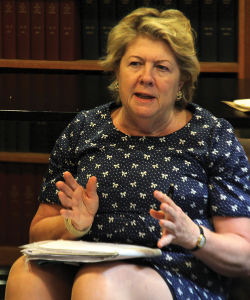
Baroness Mary Goudie called for government regulation of human
trafficking and support for its victims in McGhee Library on Thursday.
Baroness Mary Goudie, a senior member of the House of Lords and the chair of the United Nations Women Leaders’ Council to Fight Human Trafficking, discussed the role that human trafficking plays in current society, and what sort of measures should be taken to reduce its prevalence in McGhee Library on Thursday afternoon in an event sponsored by the Georgetown Institutue for Women, Peace and Security.
“Human trafficking is not just a women’s issue; it’s not a male issue; it’s not a children’s issue. It’s a huge issue that affects governments, civil society and businesses,” Goudie said. “So the whole of society is involved in human trafficking.”
Global Politics and Security Chair of the Master of Science in Foreign Service program Mark Lagon accompanied Goudie in the half-hour lecture and question-and-answer session that followed. Lagon is an adjunct senior fellow for human rights at the Council on Foreign Relations and the former executive director and CEO of leading anti-human trafficking nonprofit Polaris Project.
Lagon emphasized a need to redefine what people think of when they hear human trafficking.
“Human trafficking is not about undocumented migrants,” he said. “You never cross a border, and yet you are enslaved in what is the essence of human trafficking.”
Goudie described human trafficking as a highly corrupt business.
“Human trafficking is the biggest crime after weapons,” Goudie said. “The reason that weapons and human trafficking are the two biggest black market crime issues around the world is because they can be used more than once.”
Both Lagon and Goudie stressed that human trafficking is not just about the sex trade, although that aspect receives the most publicity. Goudie elaborated on industries such as clothing, construction and agriculture that rely on bonded labor because the profit margins are minimal.
“It’s an illicit industry and it’s all cash,” Goudie said. “The most distressing thing about human trafficking is the middle management by women around the world because people trust women.”
Goudie stressed that human trafficking is a unique problem that should not be combined with other issues.
“We shouldn’t muddle up human trafficking with refugees and asylum seekers, and there are some people who want to do this because it makes it easy,” Goudie said.
According to Goudie, reform must encompass government regulation of human trafficking, the efficient distribution of funds put toward the cause and support for victims.
“It is getting bigger, it’s not getting better,” Goudie said. “The U.N. charter on human trafficking is okay, but not very strong.”
Providing help for survivors and corporate action are key parts of managing the issue.
“Shelter and medical care have to get funding,” Lagon said. “This is slavery, and we should be able to mobilize corporations to fight this.”
The talk was primarily a call to action and a call to question the current situation.
“There are only a few thousand prosecutions in the world each year, and impunity is going to allow human trafficking to continue,” Lagon said.
Goudie spoke about the potential passing of a bill in Britain that would force companies to sign off on their supply chains, a crucial step in eliminating human trafficking.
“[Human trafficking] should very much be a part of the dialogue at Georgetown. It is our moral responsibility,” Lagon added.
Mayesha Alam, assistant director of the GIW
PS helped to organize the lecture.
“This was a wonderful opportunity to bring together not only Georgetown students, but experts in the field who are working either directly on human trafficking, or tangentially on larger issues,” Alam said.














